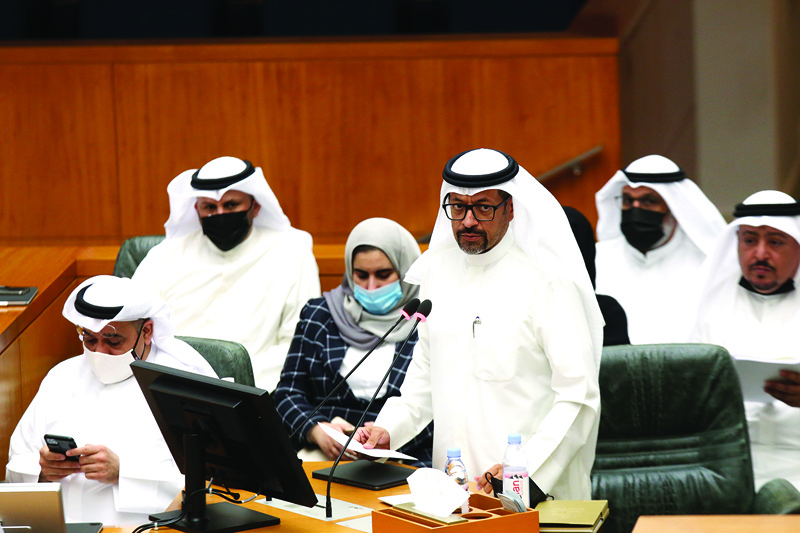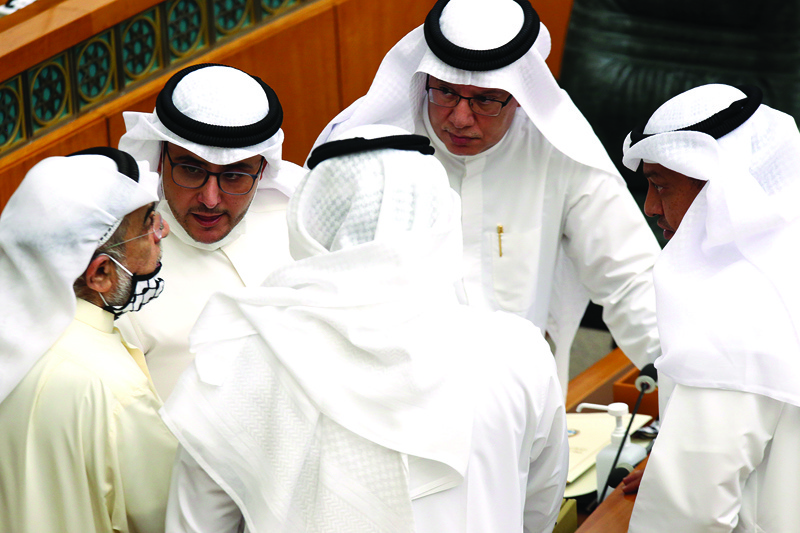 KUWAIT: Finance Minister Khalifa Hamada speaks during a special parliament session yesterday. - Photos by Yasser Al-Zayyat
KUWAIT: Finance Minister Khalifa Hamada speaks during a special parliament session yesterday. - Photos by Yasser Al-ZayyatBy B Izzak
KUWAIT: The National Assembly yesterday overwhelmingly approved a law allocating KD 600 million to grant financial rewards for over 200,000 frontline workers who worked in the campaign against the coronavirus pandemic. The assembly also agreed in principle on amendments to widen the scope and penalties of a Zionist entity boycott law stipulating a jail sentence of up to three years for dealing with Israel, as MPs strongly condemned Zionist aggressions on Jerusalem and the Palestinians.
At the start of the special session, leading opposition MP Obaid Al-Wasmi, who made a historical victory in a by-election on Saturday, took the oath to officially become a member of parliament. The frontline workers' rewards law was passed by 61 MPs and opposed by one member, MP Adnan Abdulsamad who strongly criticized the law for its limited scope and lack of regulations.
The law is applicable to Kuwaiti and expatriate employees who took part in the efforts to combat the coronavirus pandemic in the period between February 24 - May 31, 2020. Abdulsamad criticized the law for not including frontline workers who worked after June 1, 2020 until now, even those who may be infected or die as a result. He said the legislation is not needed and the government can grant the rewards through Cabinet decisions if it was serious enough. He said that the State Audit Bureau has stated that the number of beneficiaries has been highly inflated as many undeserved workers will be paid while some who deserve it will not be paid.
Finance Minister Khalifa Hamada said that the frontline workers have been classified into high risk and medium risk groups and that Kuwaitis who died while combating the disease will be treated as "martyrs" while non-Kuwaitis who died will be paid ten times their salary. MP Abdullah Al-Turaiji said that based on the lists of names, as many as 198,000 employees do not actually deserve the rewards. Opposition MP Hasan Jowhar strongly criticized the government for failing to handle this issue adding that "the biggest reward for the Kuwaiti people is the departure of this government."
 Foreign Minister Sheikh Ahmad Nasser Al-Mohammad Al-Sabah speaks with MPs during the session.
Foreign Minister Sheikh Ahmad Nasser Al-Mohammad Al-Sabah speaks with MPs during the session.Stand with Palestine
In the meantime, a large number of MPs hailed the position of the Kuwaiti government and people towards the Zionist aggressions on the Palestinians and the disposition of Palestinian homes in Jerusalem. The assembly unanimously passed in principle legislation to toughen penalties against dealing with or visiting the Zionist entity by both Kuwaiti citizens and expats who have legal residence permits in the country. The assembly asked the legal and legislative and foreign affairs committee to revise the legislation to be approved in the next session.
Speaker Marzouq Al-Ghanem read a statement approved by the assembly in which it expressed continuous solidarity and support with the Palestinian people until they establish their independent state with East Jerusalem as its capital.
The statement expressed the assembly's strong condemnation of the latest Zionist aggression on Gaza and the Zionist crimes in Jerusalem, the West Bank and against the Palestinians in the territories occupied in 1948.
The assembly also rejected a report by its educational committee which called to hold the higher secondary examinations online as only 26 MPs voted for the report from 53 members in attendance. This means that the education ministry will hold written exams in classrooms despite strong warnings by opposition MPs that the health situation is not suitable for gathering students in exam halls.
Education Minister Ali Al-Mudhaf said that stringent health conditions will be applied during the exams as six students only will sit in an examination room with a maximum of 25 rooms in a school. He however said that if the health conditions deteriorate, the ministry will hold online exams instead.










